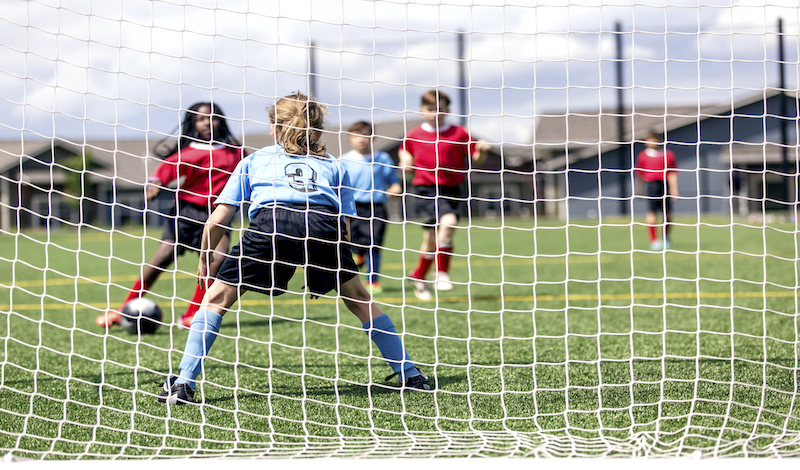
The formal and structural exclusion of transgender youth is morally wrong and unlawful.
Amid the COVID-19 pandemic, systemic racial inequity, and economic uncertainty, lawmakers in many states this year prioritized targeting transgender people for additional regulatory oppression—this time focusing on trans children.
Building on prior attempts to deny the existence of trans people by forbidding them from using bathrooms consistent with their gender identities, legislatures in several states focused on forbidding trans youth from accessing prescribed medical care and from participating in sports.
The outrage directed toward these efforts to regulate and oppress transgender youth is justified. The laws are incredibly harmful and unconstitutional, and they should be resisted in the courts. But resistance to such formal regulatory exclusion also provides an opportunity to combat the many ways our society is already structured to functionally deny many trans youth equal access to not just medical care and sports participation but lived equality.
In Arkansas, legislators decided that it was appropriate for the government to forbid youth from accessing gender affirming medical care prescribed by physicians, overriding the Governor’s veto and enacting the ban into law. Similar legislation was introduced in nearly 20 other states.
These bills suggest that the government knows more about a person’s gender and identity than the person themself. But the regulatory overreach laid bare by these bills is not nearly as important as the lived trauma they will impose on the lives of youth.
The medical care bans seek to prevent youth from accessing care, such as the initiation of puberty-delaying medications that patients and their doctors deem necessary to help them live consistently with their gender identity and that may be needed to treat gender dysphoria. The medical care bans do not protect children, as their sponsors assert, but instead they only ensure that some children continue to suffer and be denied access to established, sometimes lifesaving, care they want and need.
Moreover, laws forbidding students from playing on sports teams consistent with their gender identity deny students access to sports—a key setting for physical and social development and bonding—but also represent the states’ and the schools’ broader stigmatization of trans youths. In effect, the laws signal to all children that it is okay to treat transgender children differently, an implicit imprimatur for continued bullying of transgender children by other students, which already occurs at disproportionate rates.
In over 30 states, legislators this year have proposed bans prohibiting transgender youth from playing on certain sports teams. A handful of states enacted these bans, including Arkansas, Florida, Mississippi, Montana, Tennessee, and West Virginia. Legislators often justify the sports bans as preserving opportunities for cisgender females to participate in sports. But just as transgender individuals do not pose a threat to anyone in the restroom, transgender female athletes do not pose a threat to anyone’s athletic participation or success.
Even at the college and adult level, the National Collegiate Athletic Association (NCAA) recognizes that trans female athletes do not inherently have an advantage compared to cisgender females. The NCAA notes that “many people may have a stereotype that all transgender women are unusually tall and have large bones and muscles. But that is not true.” The NCAA has emphasized the importance of not overgeneralizing and not assuming that all transgender females “are taller, stronger, and more highly skilled in a sport than” cisgender females.
Sex is a poor proxy for athletic ability (much less a coherent and stable category itself). For example, as one federal court observed in 1977—in the context of ultimately illegal efforts to exclude females from playing on otherwise male soccer teams—“the range of differences” among people of a particular “sex is greater than the average differences” among the sexes.
The laws prohibiting transgender youth from accessing necessary medical care and playing on certain sports teams harm trans and gender variant youth, do not benefit anyone else, and are unconstitutional in that they violate equal protection, fundamental rights pertaining to bodily autonomy and medical decisions, and freedom of expression.
As explained earlier this year by law professor Katie Eyer and in a recent lawsuit filed by the American Civil Liberties Union against the Arkansas medical care ban, such bans are unconstitutional under the Equal Protection Clause because they are born out of animus and discriminate against people on the basis of their sex and transgender status.
Sports exclusion laws also likely run afoul of the Equal Protection Clause, as well as Title IX’s prohibition on sex discrimination, as many have argued for some time. In recent years, the legal consensus that discrimination against transgender people is a form of legally prohibited sex discrimination has strengthened. For instance, this past term, the U.S. Supreme Court concluded that Title VII’s prohibition on sex discrimination includes discrimination on the basis of someone’s transgender identity.
Moreover, while not all trans and gender variant people need or desire medical interventions to live consistently with their gender identity, some do, and medical care bans infringe on the individual right to make medical decisions.
In a series of court cases addressing the criminalization of prescription contraceptives, the criminalization of abortion, and the ability to refuse life-sustaining care, the Supreme Court has recognized that the Constitution’s protections for individual bodily autonomy and integrity include the ability of people to make health care decisions with the consultation of their physician. Medical care bans targeting transgender youth represent a massive infringement on that freedom of bodily autonomy.
Similarly, to the extent that accessing sex-segregated activities and conforming one’s bodily appearance to one’s gender identity are key forms of symbolic gender expression, the laws also intrude on trans students’ freedom of expression.
Medical care bans and sports exclusion laws should be struck down as unconstitutional. But even in a world without formal medical bans or formal exclusion of trans youth from sports, access to necessities for human flourishing—such as health care, extracurricular educational opportunities, or other societal goods—are unequally distributed. For example, even without a formal ban, many trans people have unequal access to gender affirming care and health care more broadly because they lack the financial means to procure it. Similarly, for trans students in school districts serving impoverished communities, funding for extracurricular activities such as sports may already be limited.
Systemic barriers to care and flourishing are just as pernicious and worthy of remedying as the formal legislative exclusion currently being enacted. The infringement caused by the formal legal exclusion underscores the need to make sure that functional, systemic barriers to care, including racial and economic inequality, are dismantled.
All told, for reasons of humanity, policy, and law, this year’s spate of anti-transgender laws targeted at transgender youth illustrates the need to resist vocally and consistently such regulatory oppression and to affirm the magnificence of trans existence. But the laws also highlight the need to make sure that all trans youth—not just individuals with the means to access medical care and extracurricular activities—are valued, loved, and provided for.
This essay is part of a 9-part series, entitled LGBTQ+ Rights and Regulation.




